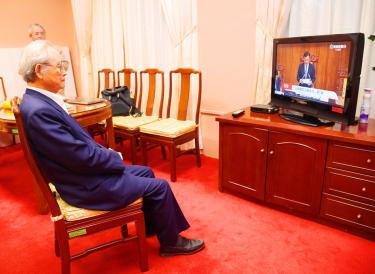The Act on Promoting Transitional Justice (促進轉型正義條例), which aims to remove authoritarian-era symbols and retry cases of injustice from that era, was passed by the Legislative Yuan yesterday evening.
The act is aimed at addressing injustices perpetrated by then-Chinese Nationalist Party (KMT) government between Aug. 15, 1945, when the Japanese government announced it had surrendered, to 1991, when the Temporary Provisions Effective During the Period of National Mobilization Against Communist Rebellion (動員勘亂時期臨時條款) were abolished.
A nine-member Transitional Justice Promotion Committee is to be created, to be overseen by the Executive Yuan, with its chairman nominated by the premier and approved by at least half of the members of the Legislative Yuan.
The committee is also to address and utilize ill-gotten political party assets, but its purview will not include items already covered by the Act Governing the Handling of Ill-gotten Properties by Political Parties and Their Affiliate Organizations (政黨及其附隨組織不當取得財產處理).
The new act states that data unconstitutionally seized during the authoritarian era are to be collated and archived and made available for research and educational purposes as long as people mentioned in the data have their privacy and their freedom of communication protected.
Authoritarian symbols commemorating dictators that are publicly displayed are to be removed, renamed or addressed by other means as a way of upholding the nation’s free and democratic constitutional system.
Criminal cases found to have been unjustly adjudicated on are to be reinvestigated by the committee, with defendants granted retrial. People found responsible for mistrials are to be held accountable and required to compensate defendants and their family members as well as to take measures to restore their reputations.
Political parties, their affiliates and organizations they operate are to report to the committee any political files in their possession which, if necessary, are to be transferred to the government and archived.
Those that fail to do so could be fined between NT$1 million and NT$5 million (US$33,341 and US$166,705) and could be subject to repeated fines.
People found guilty of disposing of, sabotaging or concealing political data owned by political parties or their affiliated organizations could face prison sentences of up to five years.
People who object to rulings by the committee would have one month to request a reinvestigation and two months to initiate an administrative lawsuit.
Chinese Nationalist Party (KMT) lawmakers said the Democratic Progressive Party (DPP) has undermined the nation’s political system by creating an agency with administrative, judicial and investigative powers.
The passage of the act heralds the dawning of a new authoritarian era, KMT Legislator Lai Shyh-bao (賴士葆) said.
The act clearly targets the KMT and overlooks atrocities perpetrated by the Japanese colonial government, he said.
“When the KMT regains political power, we will also propose a transitional justice bill targeting [President] Tsai’s [Ing-wen, 蔡英文] authoritarian rule,” he said.
Non-Partisan Solidarity Union Legislator May Chin (高金素梅) and New Power Party Legislator Kawlo Iyun Pacidal panned the act for not requiring the government to relinquish Aboriginal lands once held by the Japanese colonial government.
However, DPP Legislator Wang Ding-yu (王定宇) said the act “opened a new frontier” for victims of the authoritarian era, as the government can now legally investigate data from that period, seek out and punish perpetrators of injustice as well as compensate the era’s victims and restore their dignity.
Source: Taipei Times - 2017/12/06





















